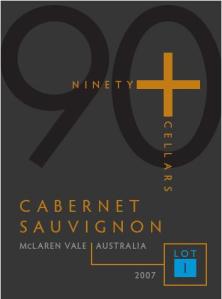This is an interview I conducted through email with Kevin Mehra of 90+ cellars.
WWJ: How long has 90+ cellars been in business? Where is the company based?
Kevin Mehra: The company Latitude Beverage has been in business since 2007 but we launched Ninety+ Cellars August of 2009 and it has quickly gained customer acceptance, we have already shipped just over 19,000 cases. The company is based in Boston MA.
WWJ: How does 90+ cellars ensure that the wine they originally sampled is the wine that they receive? I have heard of other Negociants having to “send the wine right back to China, where it came from” so to speak.
Kevin: A few things:
1. We deal with wineries that have a reputation already and can be trusted.
2. We also send every wine into a lab for a chemical analysis on the wine to check for any impurities.
3. When we taste a wine and decide to buy it we keep a sample of the wine as the standard, when the final Ninety+ bottle arrives we sample it against the standard to confirm it is the same wine. If the wine passes we pay the remaining balance due to the winery.
WWJ: How many releases has 90+ cellars released, how many current releases are there? What would you say are some of the best values?
Kevin: We are excited to be bottling lot 20 Reserve Pinot Noir from Sonoma Coast this week and just approved an Oregon Pinot Gris which would be lot 21. The best values would be the wines that sold out the quickest which would be lot 15 Pinot Noir from Carneros, it was a phenomenal wine from a producer that would retail it for around $35, our partner retailers sold that same wine for $15, and we sold out of 2,400 cases in 2 weeks. Other wines that have become very popular that we have partnered with the wineries to make extended lots and buy the next vintages on the wines are lot 2 Sauv Blanc and lot 7 malbec, which are $10 a bottle retail and are consistently our top selling wines.
WWJ: Do you reveal where the wines originally came from or did you have to sign NDA’s?
Kevin: No we do not reveal where the wines are coming from and do sign NDA’s if required.
WWJ: There is a lot of talk about “the coming carnage in the California wine Industry” as Alder Yarrow at Vinography puts it. Basically there is a wine glut, and now there are hundreds of California wineries facing foreclosure. This provides opportunities for Negociants such as yourself, but how are you going to sort through the hundreds if not hundreds of thousands of cases of unsold vintages some dating back to 2004? how do you see this cataclysmic re-organization playing out?
Kevin: I believe that things will settle down this year with consumer’s slowly moving back up to the luxury wines and wineries with luxury and trustworthy brands will be back on track. For us I am confident with our relationships with wineries in California and around the world there will always be an opportunity to buy excess wine from each vintage. We represent a very profitable part of their business, they get paid within 30 days and they don’t have to budget any commission or marketing dollars on selling the wine. Many wineries may have over-reacted to the down turn and have laid off half or all of their sales staff which I think is a mistake, in hard times you need to work harder to service your customers. The biggest problem for wineries is the technology in vineyards has improved so much that yields are much higher, I think it’s the increased yields that in the future will be the cause of the wine glut.
WWJ: The wines you purchase, are they back blended? Do you only buy finished bottling blends, or do you also buy mixing components and rework them yourselves, as some negociants do?
Kevin: No we don’t do any back blending we currently only buy finished wines or clean skins.
90+ cellars website
 Their niche is centered on buying up the excess finished wines which have scored 90 points or more, and reselling them at a discount under their own label. Which brings us to…
Their niche is centered on buying up the excess finished wines which have scored 90 points or more, and reselling them at a discount under their own label. Which brings us to…